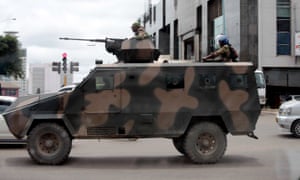Editorial: The ruthless crushing of protests shows how little has changed since Emmerson Mnangagwa took over

People do not always want to be proved right. Many Zimbabweans watching the brutal crackdown on protests this weekend were the same people who had celebrated Robert Mugabe’s ousting in 2017. But they had tempered their optimism by warning that only very limited and superficial improvements were likely. They predicted that the successful coup would further embolden the military, and that putting in charge the feared security chief Emmerson Mnangagwa was a recipe for further repression. Irregularities at last year’s election, and the violence used to suppress ensuing protests, made their case for them. Now reports of torture, indiscriminate beatings, live fire and arbitrary arrests have rammed it home. At least 12 people have been shot dead and hundreds have been arrested.
Even some sceptics had hoped the new president would at least alleviate economic woes. Instead, conditions have worsened. In December, inflation hit a 10-year high, officially reaching 42% (though one estimate put it at around 235%). The government then more than doubled fuel prices, triggering calls for a strike. Unions organising the protest urged participants to “stay away” from demonstrating for fear of state violence. But thousands took to the streets, looting and rioting broke out, and the state struck back viciously. Mr Mnangagwa was forced to return home just as he was supposed to be telling global leaders at Davos that Zimbabwe was open for business. The bloody repression, and internet shutdown, are unlikely to entice foreign investors.
The regime’s pronouncements on the protests have been extraordinarily mixed. It blamed the political opposition and warned that repression was “just a foretaste”; then blamed shootings on criminals who stole uniforms from security forces. Mr Mnangagwa, returning from his week’s absence, then promised that “heads will roll” if it emerged that security forces had committed abuses. But the crackdown has continued.
Such contradictions have prompted discussion of internal divisions and of whether Mr Mnangagwa or the vice-president, Constantino Chiwenga, who helped install him, have driven the hard line. Overt military intervention looks like a sign of the army’s increased confidence. But observers also suspect a “good cop, bad cop” strategy. Blaming individuals is a diversion, as Mr Mugabe’s departure should have shown already. Zanu-PF’s elite live off the system and have few prospects outside it, but have long been riven by the struggle for power and resources. While factions rise and fall, no one inside the structure shows an interest in loosening its grip on power. As a prominent member of the Movement for Democratic Change has observed, “You can’t reform without reformers”.
This makes it all the more important that others in Zimbabwe are supported. Mr Mnangagwa appears more concerned about international opinion – and the cash flows affected by it – than his predecessor. That provides an opportunity. Leaders must press Zimbabwe to halt this violence and retaliation. To lift sanctions at this moment, as the South African president, Cyril Ramaphosa, has proposed, would send the wrong signal. The US measures are targeted at individuals; their removal is conditional on human rights improvements; and their impact on the economy is negligible compared with that caused by widespread corruption. In contrast, US aid that was cut off last year should be restored to Zimbabwean rights groups, some of which are dealing now with the terrible results of the violence. The people who got Zimbabwe into this economic and political disaster cannot be expected to get it out of it.
COMMENTS
Yes it is targeted at individuals but why are we paying the price for them. They control the RBZ . So it is obvious any monies that is coming in is being stolen. If that is the case who will invest. We need a non Zimbabwean running the RBZ with no affiliation to any party. This will quell corruption to a minimum and internal audits of all businesses will do the same. Mugabe realised this and stripped all necessary working machinery introduced by Smith so that they could plunder. The result is chaos today.